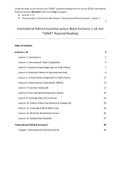Combined notes on the lectures and *SOME* required readings from the course (2022) International
Political Economy. INCLUDES notes from (Total: 43 pages):
● Lectures 1-13.
● Thomas Oatley’s (2019) book (6th edition) “International Political Economy”, chapter 1.
1
International Political Economy Lecture Notes (Lectures 1-13) and
*SOME* Required Readings
Table of Contents
Lectures 1-13 2
Lecture 1: Introduction 2
Lecture 2: International Trade Cooperation 4
Lecture 3: Society-Centred Approach to Trade Politics 7
Lecture 4: Domestic Politics of International Trade 9
Lecture 5: A State-Centred Approach to Trade Politics 11
Lecture 6: Multinational Corporations (MNCs) 13
Lecture 7: Economic Statecraft 17
Lecture 8: The International Monetary System 21
Lecture 9: Exchange Rates & Currencies 24
Lecture 10: Politics of Non-Tax Revenue & Foreign Aid 29
Lecture 11: Sovereign Debt & Debt Crises 32
Lecture 12: IPE & the Global Environment 35
Lecture 13: Globalisation Backlash 37
“International Political Economy” 40
Chapter 1 International Political Economy 40
, 2
Lectures 1-13
Lecture 1: Introduction
Political Economy
Economics: Study of the production, distribution, consumption of scarce resources.
Political economy: Study of the role of state & politics in the production, distribution, consumption
of scarce resources.
➔ Comparative Political Economy (CPE): Focuses on domestic economic policies (e.g., capitalist
systems, variations in institutions, industrial policies).
◆ CPE → IPE.
➔ International Political Economy (IPE): Studies the politics of the flows of production,
distribution, consumption across national borders (e.g., foreign businesses, businesses,
national & local governments, international institutions).
◆ IMPORTANCE → few economic flows that are NOT global.
Winners & losers of different economic policies:
● State makes decisions that have heterogeneous consequences across society
(FUNDAMENTAL LAW = NO NEUTRALITY).
● Some benefit, some lose (i.e., taxation, trade policy, social programmes).
➔ Distributional consequences of policy matter:
◆ There are political constraints on what is economically possible.
◆ Do NOT assume that the government is trying to improve general welfare.
Political economy = ideas & ideology < more about who gets what, when, where.
➔ Ideas matter BUT maybe NOT much → often scholars will give credit to ideas when
incentives offer a more compelling answer.
➔ Material interests rule everything.
➔ The consequences of international flows:
◆ Trade = goods & services.
◆ Capital = finance, currency.
◆ Immigration = people, labour.
◆ Environment = pollutants.
Approaches to IPE
Old schools:
1. Mercantilism: Focuses on the state > subnational interests.
➔ States use economic policy to increase power (tool).
➔ National power comes from economic power.
◆ Exports > imports → bring money in & increase power
◆ Exports vary in their importance (manufactured goods >).
➔ IMPLICATION = economy “should” be controlled to gain power.
➔ Power = FUNDAMENTAL variable.
2. Liberalism: Countries & individuals gain from trade by exploiting comparative advantages.
, 3
➔ Main focus = individual welfare.
➔ NO harm in engaging in trade.
◆ “A rising tide lifts all boats” → all trade is good, NOT just a positive balance
(i.e., exports > imports).
◆ States’ role should be limited.
3. Marxism: NOT the policy prescriptions but the theory underlying them.
➔ 2 central factors (players) = downside:
I. Capital (means of production)
II. Wage labour.
➔ Natural tendency of capital concentration:
◆ Competition → efficiency → small elite → unequal society → revolution.
➔ The state exists to protect capital (NOT labour).
➔ Internationally = exploitation of the South by the North.
➔ IMPLICATION = capitalism is bad for the distribution of wealth.
3 approaches:
● Strengths = offer a way to view political & world economy (important actors, relationships,
recommendations).
● Limitations = rigid frameworks & dependence on questionable assumptions (normative
views on how the world “should” work).
New approach:
4. Modern Approach (Interest & Institutions): Studies the interaction between societal interest
& the political institutions that funnel them to policy.
➔ Use assumptions about interests & institutions to build models.
◆ Interests: What drives political behaviour (who wins/who loses from a
certain policy?). Depends on the questions being asked (need
assumptions/simplification).
● Material (societal) = what increases your welfare? Can be shaped by
endowments:
○ Skill levels (factor of production → land, skilled/unskilled
labour, capital).
○ Industry (sector).
● Political (institutional) = what will keep me in political office?
◆ Institutions: A set of enforced/unenforced rules that govern behaviour.
Types:
● Domestic = democracy/dictatorship, presidential/parliamentary, # of
parties.
● International = WTO, UN, NATO, EU.
➔ Own flexible assumptions BUT often ignore potentially important variables (e.g.,
culture, ideas/norms) → can be accommodated by relaxing model’s assumptions.
➔ Framework:
1. Societal interests (how institutions shape them)/elite interests.
2. Democratic/autocratic institutions.
3. Political interests.




